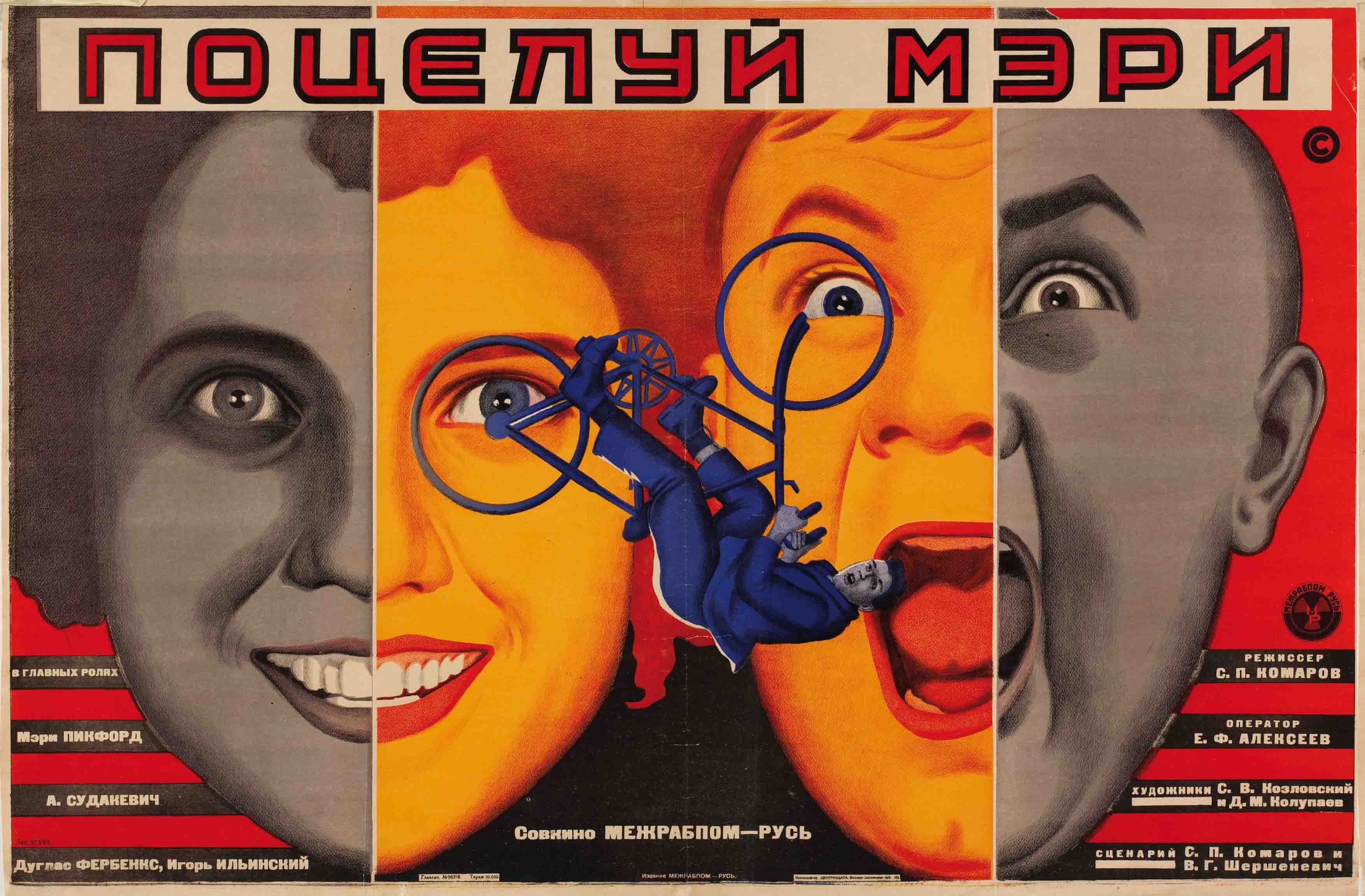« Hail the American Mustang! | Home | GoEast Symposium April 2012: RealAvantGarde – With Lenfilm through the short 20th century »
“The Red Dream Factory” Berlinale Retrospective 2012
By Barbara Wurm | February 14, 2012

Pozelui Meri Pikford (The Kiss of Mary Pickford) – Poster by artist Semjon Semjonow (1927), courtesy Russian State Library, Moskow
This year’s Berlinale retrospective sounds promising: The Red Dream Factory. What it is actually about is easy to explain – the most productive and avant-garde years in Soviet film history and its relation to the Weimar Republic – yet hard to describe. The word ›factory‹ relates to the common notion used in the early years of the Proletarian State in order to make clear that what was going on in a film studio was actually linked to the workers’ world. ›Red‹ then quite obviously stands for the broad range of leftist ideology (from Marxism via Socialism and Communism towards Leninism, and later Stalinism).
In the given case it does, though, also slightly allude to the universal idea of love, leading us directly to the third and most ambiguous title element: the dream. The film studio presented in the retrospective – Mezhrabpom-Rus’ from the time of its foundation around 1923/1924, but renamed to Mezhrabpom-film from 1928 to the end of its existence in 1936 (when it was shut down by Stalin’s rigorous cultural politics) – produced approximately 600 films, out of which an enormous number was dedicated not to so much to the fabrication of utopian imagery, but rather to an intellectually and aesthetically ambitious analysis of the (first) crucial decade of the 20th century … decisive as much as for politics as for the art of cinema.
Together with its German branch Prometheus the studio – basically a surprise-coup-invention by one of Russia’s leading producers, Moisei Aleinikov, and Germany’s »red media entrepreneur« Willi Münzenberg and his Internationale Arbeiter-Hilfe (Workers International Relief / Mezhrabpom) – was the only partially private film corporation on Soviet soil, enabling relatively independent production strategies within a centralized state. The big masters of Russia’s film world – directors like Vsevolod Pudovkin or Lev Kuleshov – worked for the studio, the old guard (comedy director numero uno Jakov Protazanov) was brought together with the new generation, Boris Barnet for example, the most talented of all genre experts, who – delivering one jewel after another – is by now (finally and generally) recognised a mile stone figure in film history. Miss Mend, the exhilarating three-part-detective story, he and co-director Fyodor Otsep made in 1926, and his Soviet-everyday-life-comedies The Girl With the Hat Box (1927) and The House on Trubnaya (1928) belong to the most delicate and sophisticated films of Early Soviet cinema. The retrospective, however, will also show Barnet’s Ledolom, an anti-Kulak film shot in 1931, something to look forward to for those eager to penetrate more or less undiscovered fields of film history.
Overall, the programme, curated by Alexander Schwartz and Günter Agde is a fine mixture of renowned classics – like Nikolai Ekk’s The Road to Life, the first Soviet sound feature film from 1931, or Dziga Vertov’s Three Songs of Lenin (1934 / 38 / 70 the sound version, 1935 / 38 the silent one) –, a series of well known (but seldom shown) films from Protazanov’s Aelita (1924) to Slatan Dudow’s Kuhle Wampe (1932), a good load of absolute rarities (like the excellent Torn Shoes, 1933, by Margarita Barskaya or the first robot-film, Aleksandr Andriyevsky’s Loss of the Sensation from 1935) and, finally, some real discoveries (like Igor’ Savchenko’s Accidental Meeting, 1936 or Vladimir Shneyderov’s The Golden Lake, 1935). Surely, some of the greatest treasures can be found in the documentary and animation section.
Once these films were an active and lively element of European film history, Mezhrabpom a major player in the film industry. Revolutionary thinking migrated between the political and aesthetics. Entertainment went along with enlightenment, exalted laughter with real social realism, abundant costumes with working class outfits. Mezhrabpom had its factory in Moscow, but head-quarters in Berlin. It’s about time that this German-Russian enterprise will shine in its full glory on Berlin’s screens.
Topics: International Reports, KINO #102 Berlinale 2012 Issue, Misc. | Comments Off on “The Red Dream Factory” Berlinale Retrospective 2012
Comments are closed.
